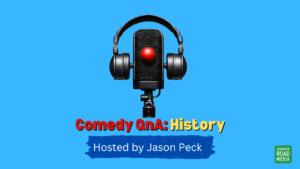I came across an old article recently, which was published on The New York Times website. I thought it was very interesting and I wanted to re-publish the odd extract here along with my own comments.
In the article Seriously, the Joke Is Dead, Warren St. John discusses the view that the joke is dead. This article coincided with the release of the documentary “The Aristocrats” which was released in 2005. (A quick side note, if you haven’t seen this documentary yet, I highly recommend it – very offensive but very good).
Specifically what it talks about is the death of what I refer to on this blog as Street Jokes or joke stories. Oftentimes they would take an entirely fictional premise and frequently involve some sort of anthropomorphism.
Example…
“A grasshopper walks into a bar and says: “I’d like to order a drink please”. The barman says “Wow, a talking grasshopper. We have a drink named after you. The grasshopper says: “You have a drink named Irving?”
Thankyouverymuch.
On more than one occasion, a joke story contains a lot more narrative before the inevitable punchline. So there would be quite a lot of set-up before the audience had the laugh.
By using joke stories such as the one above you essentially telegraph that you’re going to say something funny. In the article Penn Jillett, one half of Penn and Teller said:
“A joke is a way to say, ‘I’m going to do something funny now… If I don’t get a laugh at the end, I’m a failure.”
The article says that joke stories that use a narrative set-up, ridiculous details and a punchline have been “displaced by observational humor and one-liners”. However, a lot of observational humour can have a narrative set-up, especially if you’re telling a funny story, and ridiculous details are still included.
It all helps to make what you’re saying funny. There’s often a lot of exaggeration or understatement in comedy and humour. In George Carlin’s last full interview he said that:
“Comedy’s all about comparisons and contrasts and congruities and incongruities and heightenings and understatement and exaggeration”.
So I can’t completely agree with that argument. The basic form of structuring the comedy is very similar, but a lot more personal.
Kiss of Death
Comedian Lisa Lampanelli said that jokes were considered “the kiss of death.” She goes on to say that: “you don’t tell joke jokes onstage ever, because then you’re a big hack.”
I have to agree with Ms. Lampanelli, but only to a degree. I’m pretty sure there’s a clip of her on the Aristocrats DVD performing the Aristocrats joke on stage in a comedy club show.
I believe that in the comedy club market you would be considered a hack. Many comedians in this market perform short comedy bits which often slot together to form routines. Routines usually comprise staying on a topic for a longer period and having laughs about every four to six a minute, or every three lines of set-up.
However, for a comedian or humorist working outside the comedy club market in, say, the corporate market then I think opening with joke stories, or judiciously sprinkling the odd one throughout your set or speech can help anchor an audience to what you’re doing.
Even though comedy, and stand-up in particular, is a dominate entertainment form these days, there are still those people who aren’t necessarily savvy to how it all works.
By using the occasional street joke in this sort of market you can appeal to how many people still think of the comedian – a teller of joke stories. Using a polished and edited street joke to open a set immediately clues the audience into the situation. Everyone knows the street joke format, so they get what they’re expecting.
Takeaway Value
A street joke can also help you get through the situation where someone asks you to tell them a joke, when they know that you’re a comedian. It provides audience members with a little takeaway value. The majority of people like to recite a comedian’s material, so why not give them something that is packaged and easily remembered?
There are still comedians, certainly in the U.K., who regularly use joke stories or, at least, the structures. There is nothing inherently wrong in what they’re doing. A lot of them make very good money indeed being funny in this manner, although they are generally classed as old school comedians. One brilliant example is a comedian called Mick Miller, he still plays to packed houses. Check him out if you can.
The Best of Both Worlds?
That said Peter Kay, another comedian from the North of England, is able to straddle two types of audiences: the traditional mainstream audience that are used to the old joke-teller comics and the new mainstream audience that are used to routines and stories. He does this by opening his set with a few street jokes, commenting on them if they are terrible, then segueing into routines and stories.
For instance, and I’m aware that you lose a lot of a comedian’s delivery when you transcribe it, he opened one show like this (and I’m paraphrasing):
“Shakespeare walked in a pub and the barman said: Get out you’re barred. Barred! D’you see? Because he was a Bard.”
This line got a mild laugh, but he then went on to explain to the audience why the joke was funny. He didn’t have to do that at all, but in doing so, with mock outrage, he made it funnier because he was saying that the reason for the mild laugh was not that the joke was bad, but that the audience didn’t understand it.
There doesn’t seem to be a general consensus as to why the joke has died. There are numerous reasons cited such as email jokes, the feminization of American culture, political correctness and the atomic bomb (yeah, that’s what I thought).
Mean Spirited
Political correctness perhaps does have something to answer for because many people associate joke stories with offensive content – many street jokes that get told around the water cooler at work were sexist, racist, or anti one thing or another. They often have, what Penn Jillette described as, “a mean-spirited component”.
P.C. seems to have put an end to this type of joke.
That said, I can’t fully agree with my own statement either because I know that people still tell these types of jokes. Not necessarily around the works’ water cooler any more, but they tell them nonetheless.
In our modern age, specifically over the last 40 years or so, as our way of living as sped up so have people’s thirst for humour. Our credit “card-instant-gratification” mentality we want our humour now and we want it fast.
Headliner Level Comedy
Telling joke stories isn’t always conducive to this as they often take too long to get to the punchline, which is one of the reasons why Headline-level stand-up routines have laugh lines every 4-6 minutes, or about every three lines. Typically, a street joke has five or more lines before it gets to the punchline. The structure is not always suited to this level of mirthmaking.
You don’t need to tell joke stories at all if you are planning a career as a comedy entertainer. If you are naturally funny, all you really need is the ability to capture your own sense of humour.
Also, the thing to do is either edit the joke down to a workable format where you can get to the punchline quicker, or to insert additional punchlines along the way to the big finish. I talk about this a lot in one of my older posts about joke stories here.
Comedy works in the same way fashion does, eventually people will hunger for something else, a different way of doing things. So the joke-telling style will probably cycle back round again.
In the UK at least there are still comedians making a living at delivering this sort of comedy. Whilst they may be seen as hacks, they don’t seem to care as it’s their job. It could be transformed and influenced by the comedy that we currently have, which would make it more about introspection and self-expression? Or it will flip back completely to the ridiculous, obviously, fictional style of old.
In the comedy club market then, joke stories, are not completely dead. But maybe they are on some sort of comedy life-support.
Note: There are affiliate links on this page. That means that if you buy a product through my link I get paid a commission. This is one of the ways that I pay the bills.



